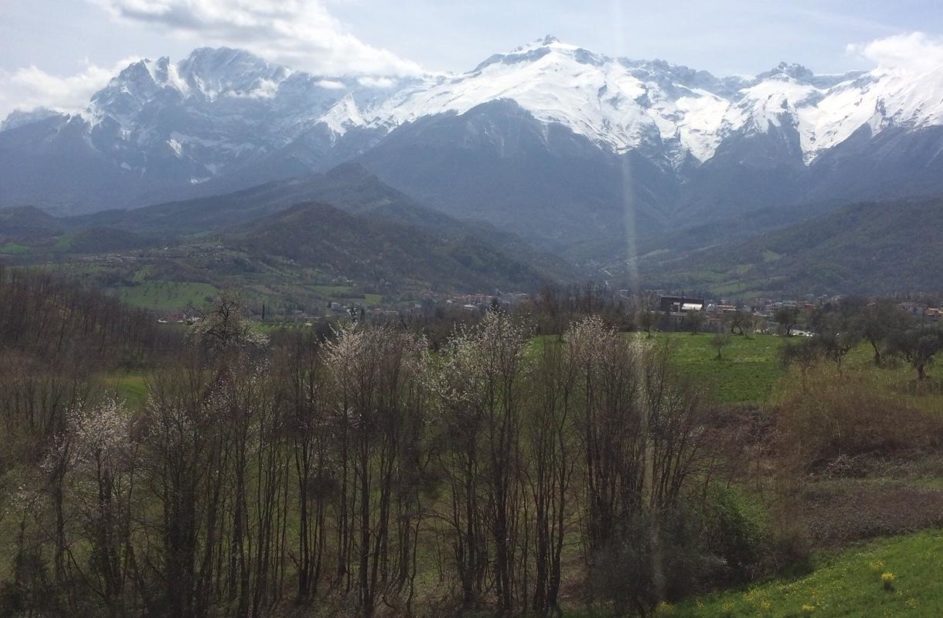Composer and University of Tennessee associate professor of music theory/composition Dr. Brendan Paul McConville was surprised to learn that no one had ever set to music the poetry of one of Europe’s most flamboyant, romantically irresistible lovers and simultaneously repulsive philanderer, fascist provocateur and war advocate.
Italy’s most brilliant poet since Dante Alighieri, Gabriele D’Annunzio (1863-1938) had a lifespan that roughly paralleled Dante’s (1265-1321), 600 years apart.

CD cover of “Un D’Annunzio Nuovo.” Photo by KnoxTNToday
D’Annunzio was prominent in Italian literature in the decades before and after the turn of the 20th century. His ideas about fascism during the years building up to World War I turned him into a national hero. He got the attention of both Benito Mussolini and Adolf Hitler.
But after World War II, his literary contributions were largely forgotten, and he disappeared from public consciousness.
Recent years have seen a revival of interest in D’Annunzio’s literary work, especially his poetry.
He came to McConville’s attention through his wife, Annachiara Mariani, who is from the area of Italy D’Annunzio called home. With the help of a Fulbright Scholarship, McConville decided to explore setting to music D’Annunzio’s four-stanza poem “La Pioggia nel Pineto” (“The Rain in the Pine Forest”).
After spending time in Italy in 2016, exploring the region that inspired D’Annunzio and making field recordings, McConville wrote music for the poem’s four sections for soprano, tenor and piano.
The final recording also included a setting for “Vorrei” (“I Would Like To”), written for soprano and piano, as well as “Le Meditazione del Merlo” (“The Blackbird Meditation”), scored for flute and piano.
The title of the finished album, “Un D’Annunzio Nuovo” (“A New D’Annunzio”), hopes to be part of the resurrection of the gifted author’s poetry.

Dr. Brendan McConville, in Italy making field recordings that became an integral part of his music score for “Un D’Annunzio Nuovo.” Photo by Brendan McConville
As part of McConville’s musical underpinning of the poetry, he recorded the sounds of the forest, birds and sea. After manipulating these soundscapes, they function as both texture and context for the lyrics, sung by soprano Manuela Formichella and tenor Nunzio Fazzini. Giuliano Mazzoccante was the pianist for the songs. Michela de Amicis was the pianist for “The Blackbird Meditation.” McConville was in the studio for most of the recording sessions.
The background storm clouds, ocean waves and birds that begin the opening stanza place the music in a nature context. McConville’s careful, low piano notes, offset with high notes, ride delicately underneath the singer’s voice.
In the opening stanza, “Taci” (“Hush”), there are birdcalls, storm clouds and waves in the soundscape, over which McConville writes corresponding, low piano notes. Then Fazzini’s rich tenor voice sings “Hush, on the edges/of the wood I cannot/hear words you say/human words; but I hear/newer words/that drops of water and leaves speak/distantly.”
There are hints of Satie, Debussy and Ravel in McConville’s piano writing. But, combined with the soundscapes, it is distinctly his own.
In the third section, a woman’s voice whispers underneath the wave soundscape. Then Formichella’s lovely soprano voice sings, “Listen, listen, the chord/of airy cicadas/little by little/hushes/under the cry/that grows; but a song mixes in/more raucous/than what rises from below/from wet, distant shade.”
This isn’t really poetry – or music – about nature, as such. Nature is D’Annunzio’s disguise for seduction. Of coming together as lovers the way the forces of nature collude and suggest until one element makes others possible: nurturing, sometimes prodding, sometimes caressing.
This also isn’t music to listen to on your way to work. It requires silence to pick up both the subtleties of the soundscapes, the lovely sensitivity of the piano score and the beautiful tone of the voices. It’s music for after the noises of the house have quietened down for the evening and the lights have been turned low.
McConville is currently in Washington meeting with the Italian ambassador to the United States, Armando Varricchio. It’s part of a gathering of past Fulbright Scholars.
“Un D’Annunzio Nuovo” is available for download at Amazon, iTunes and other streaming sources, as well as in CD format.

